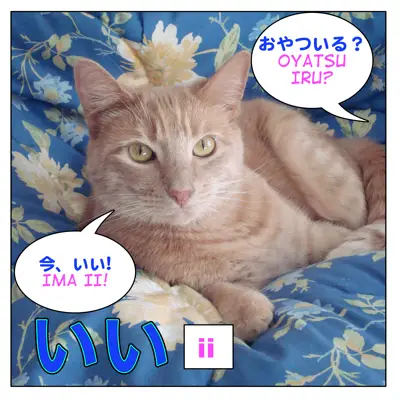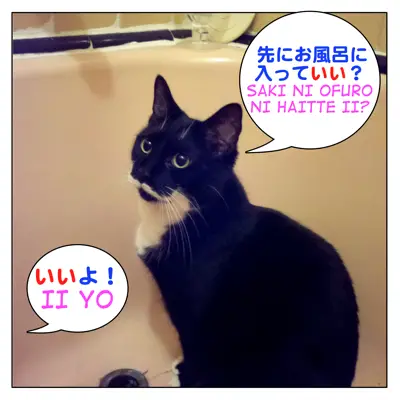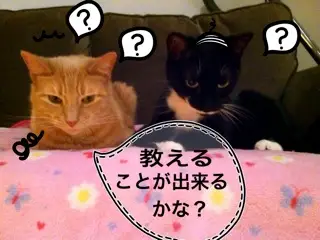
Salvador :「おやついる?」
= Oyatsu iru?
= Do you want a snack?
Kitchu :「今、いい!」
= Ima ii!
= No thank you. (Not now)

Salvador : 「先にお風呂に入っていい?」
= Sakini ofuro ni haitte ii?
= Can I go ahead and take a bath?
Kitchu : 「いいよ!」
= iiyo!
= Sure! Go ahead!
Hi everyone!
Today we have these two wonderful guest teachers,
サルバドール先生 ( = Salvador Sensei ) & キッチュー先生 ( = Kitchu Sensei )
Yes, they are cats!
They offered us their “paws” as soon as they found out we were looking for guest teachers.
This is the picture that they sent me on Twitter.
⬇️

左 ( = hidari = left) Kitchu (女 = onna= female) + 右 ( = migi = right) Salvador (男 = otoko = male)
「教えることが出来るかな?」
= Oshieru koto ga dekiru kana?
= We wonder if we will be able to teach you.
Great! We just learned the suffix, かな ( = kana) in our previous lesson.
Yes, they can! And our site needs them because
⬇️
猫の手も借りたい… 🐈
= Neko no te mo karitai…
= [Literally–>] We are so busy and we even need to borrow cats’ paws.
We use this expression when we are very busy and are desperate for help.
*********************
こんにちは、はじめまして! キチューとサルバドールです。
= Konnichiwa, hajimemashita! Kitchu to Salvador desu.
= Hello, nice to meet you! We are Kitchu and Salvador.
マギー先生はよく猫を追っかけたと聞いていますが、今日はそんなことは忘れてがんばって皆に日本語を教えます!
= Maggie Sensei wa yoku neko wo okkaketa to kiite imaseu ga kyou wa sonna koto wa wasurete ganbatte mina ni nihongo wo oshiemasu.
= Although we heard Maggie Sensei used to chase cats, we will try to forget about that and do our best to teach you Japanese today.
OK, in the previous lesson, Bunta-Sensei taught you で(も)いいです vs. がいいです ( = de (mo) ii desu vs. ga ii desu)
Maggie told us that someone asked if the meaning of いいです ( = iidesu) could mean more than “good or nice”.
So today we will teach you a deeper usage of いい ( = ii).
ミャ~~!!= Myaaa!!! = Ready?? (=^・ェ・^=)ノ”
Oh, sorry. We will switch languages.
1) First いい( = ii) does mean “good/nice”
Ex. これはいいワインだ。
= Kore wa ii wain da.
= This is a nice (or expensive) wine.
Ex. 彼はいい人だ。
= Kare wa ii hito da.
= He is a nice person.
Ex. マギー先生のサイトはいいサイトだ。 :)
= Maggie Senesi no saito wa ii saito da.
= Maggie Sensei’s site is a good site.
Ex.「アナ雪観た?」
= “Ana Yuki” mita?
= Did you see “Frozen”?
「うん、観た! いい映画だね。」
= Un, mita! Ii eiga dane.
= Yes, I saw it. It’s a good movie!
(Note: アナ雪 = Ana Yuki = (abbreviation of アナと雪の女王 = Ana to Yuki no Jouou = The Japanese title of the Disney movie, “Frozen”)
2) to like something/someone
Ex. この曲いいね!
= Kono kyoku iine!
= I like this song. (←This song is nice!)
Did you know that the “Like” button on Facebook is called いいね ( = iine) in Japanese?
⬇️
「いいね!」を押す
= “Iine! wo osu
= Click the “Like”
or
「いいね!」する
= “Iine!” suru
= Like it. / To give something a “Like”
Ex. 「ねえ、お寿司食べに行かない?」
= Nee, osushi tabeni ikanai?
= Hey, do you wanna go eat sushi?
「いいねえ。」
= Iinee.
= Sounds good!
Ex. 夏は冷たい麺の方がいい。
= Natsu wa tsumetai men no hou ga ii.
= I prefer cold noodles in the summer.
If you haven’t studied the difference between ~でいい ( = de ii) / ~がいい ( = ~ ga ii) , please go back and study this lesson.
3)to give someone permission to do something, when you ask someone for a permission
See the picture above.
Salvador : 「先にお風呂に入っていい?」
= Sakini ofuro ni haitte ii?
= Can I take a bath before you?
Kitchu : 「いいよ!」
= iiyo!
= Sure! Go ahead!
Ex. 「ここにある傘を借りてもいいですか?」
= Koko ni aru kasa wo karite mo ii desu ka?
= May I borrow this umbrella?
「いいですよ。」
= Ii desuyo.
= Yes, you may.
Ex. 5時になったら家に帰ってもいいです。
= Goji ni nattara ie ni kaette mo ii desu.
= You can go home at 5 o’clock.
Ex. 「これ食べてもいい?」
= Kore tabete mo ii?
= Can I eat this?
「だめ!」
= Dame
= No, you can’t!
4) When you have/had something too much or enough and you don’t want it/them anymore.
It is often used in this pattern,
→ (もう)~はいい = ( mou) ~ wa ii = No more ~ / had enough with ~
(We also say もう〜はたくさんだ/たくさんです ( = mou ~ wa takusanda / takusan desu.)
Ex. もう漢字の勉強はいいです。
= Mou kanji no benkyou wa iidesu.
= I have studied kanji too much. / I have had enough with Kanji.
Ex. もうお酒はいいです。
= Mou osake wa iidesu.
= No more sake! (I had too much)
Ex. 私はもういいからこれ食べちゃっていいよ。
= Watashi wa mou iikara kore tabechatte iiyo.
= I had enough so you can finish eating this.
Ex. 恋愛はしばらくいいです。
= Ren-ai wa shibaraku ii desu.
= I have had enough of love for a while.
5) When you decline someone’s offer, “No thank you!”
Let’s see the picture above again.
Salvador :「おやついる?」
= Oyatsu iru?
= Do you want a snack?
Kitchu :「今、いい!」
= Ima ii!
= No, thank you. (Not now)
Ex. Kitchu 「マギーも一緒に散歩に行く?」
=Maggie mo issho ni sanpo ni ku?
= Do you want to go for a walk with us, Maggie?
Maggie「私はいい… 一人で行くから。」
= Watashi wa ii…Hitori de iku kara.
= No thank you! (No I am good) I will go there alone.
コンビニで ( = konbini de) At a convenience store
店員 : 「こちら、温めましょうか?」
= Ten-in : Kochira atatamemashouka?
= Shop clerk: Would you like us to heat it up (in the microwave oven)?
客 :「あ、いいです。」
Kyaku = Ah, iidesu.
Customer = No, thank you.
***
店員 : 「袋に入れしましょうか?」
= Ten-in : Fukuro ni iremashou ka?
= Shop clerk: Would like us to put this in a plastic bag?
客 :「いいです。」
= Kyaku : Ii desu.
= Customer: No, thank you.
So this いいです( = iidesu) means 温めなくていいです。( = Atatamenakute iidesu.) You don’t need to heat it up. . / 袋はいらないです。( = fukuro wa iranai desu.) I don’t need a bag.
📝 Note: Hmmm I know some of you think, this is getting confusing.
When the shop clerk asks you
「こちら、温めてもいいですか?」
= Kochira, atatamete mo iidesu ka?
= May I heat this up (in a microwave oven)?
or
「袋にお入れしてもいいですか?」
= Fukuro ni oire shite mo ii desu ka?
= May I put this in a plastic bag?
If you just say,
「いいです。」
= Iidesu.
shaking your head, they will take it as “No, thank you!”
But technically if you add はい ( = hai) yes, like this:
「はい、いいです。」
= Hai iidesu.
nodding your head,
You will be giving them permission. And they will understand your words to mean:
“Yes, you may. (Yes, please.) ” (I want you to heat it up/I want you to put it in the bag.)
But to avoid any confusion, it will be safer to say
「はい、お願いします。」
= Hai onegai shimasu.
= Yes, please.
if you want them to do it.
Here Are some more examples:
Ex. 「これ捨ててもいい?」
= Kore sutete mo ii?
= Can I throw this away?
⬇️
「うん、いいよ。」
= Un, iiyo.
= Yes, you can.
Ex. 「これ捨てなくてもいい?」
= Kore sutenakute mo ii?
= I don’t need to throw this away?
⬇️
「うん、いいよ。」
= Un iiyo.
= No you don’t have to.
Related lesson: How to answer negative questions in Japanese.
⬇️
はい and いいえ ( = hai and iie) Yes and No in Japanese.
6) Sometimes we use いい ( = ii) sarcastically
*いい年 ( = ii toshi)
Ex. 彼女もいい年になったね。
= Kanojo mo ii toshi ni nattane.
= She has reached a nice age.
![]() We also use it sarcastically referring to an adult who does silly things for their age.
We also use it sarcastically referring to an adult who does silly things for their age.
Ex. いい年をしてそんなこともわからないの?
= Iitoshi wo shite sonna kotomo wakaranai no?
= You are old enough to know better.
*いい大人 ( = ii otona) nice adults
Ex. いい大人になりたい
= ii otonai naritai.
= I want to be a good adult (in the future).
* It also refers to an adult who doesn’t act their age
⬇️
Ex. いい大人が小さい子のおやつをとるなんてみっともない!
= Ii otona ga chiisai ko no oyatsu wo toru nante mittomonai!
= Shame on you! A grow-up taking away a snack from a little kid!
*いい気になる ( = ii ki ni naru) = to get full of oneself, to be arrogant, to get carried away
Ex. いい気なもんだね。
= Iikina mon dane.
= You are so full of yourself.
*いい( ご)身分 = ii (go) mibun = a person in a high position
![]() When you complain about someone who is very selfish or expresses your envious feeling towards people who can do what they like sarcastically.
When you complain about someone who is very selfish or expresses your envious feeling towards people who can do what they like sarcastically.
Ex. 仕事もせずに遊んでばかりなんていいご身分だね。
= Shigoto mo sezu ni asonde bakari nante ii gomibun dane.
= What a lucky life you have! (You are so selfish) just playing around without working.
*いいざま ( = iizama) When you laugh at someone’s mistake or miserable condition
Ex. あんな弱いチームに負けるなんていいざまだ。
= Anna yowai chiimu ni makeru nante iizama da.
= It’s pathetic that they lost against such a weak team.
*いい時間 ( = ii jikan) good time (to do something)
Ex. 都合のいい時間は何時ですか?
= Tsugou no ii jikan wa nanji desuka?
= What time is convenient for you?
![]() when it is getting late
when it is getting late
Ex. もういい時間だから帰らないと…
= Mou ii jikan dakara kaeranaito…
= It is getting late so I have to go home now.
7) It is sometimes used to emphasize a negative word.
*いい恥さらし = ii hajisarashi = shame / disgraceful (strong expression)
Ex. ネットに家族の悪口を書くなんていい恥さらしだ。
= Netto ni kazoku no waruguchi wo kakunante ii hajisarashida.
= It is disgraceful to write bad things about your own family.
*いい迷惑 ( = ii meiwaku) When you are involved in some trouble which has nothing to do with you
Ex. 上司が売り上げをあげたいのはわかるがずっと残業続きでいい迷惑だ。
= Joushi ga uriage wo agetai nowa wakaru ga zutto zangyou tsuzuki de ii meiwaku da.
= I understand our boss wants to boost sales, but it is so annoying to be constantly working overtime.
*いい鴨(カモ)になる ( = ii kamo ni naru) = to be an easy target, a sucker
Ex. あのお客は店主のいいカモになっている。
= Ano okyaku wa tenshu no ii kamo ni natteiru.
= That customer is an easy target for the shop owner.
8) to imply a romantic relationship
Ex. 誰か、いい人いない?
= Dare ka ii hito inai?
= Do you know any good man/woman (to date)?
Ex. 彼もいい人見つけないと!
= Karemo ii hito mitsukenaito.
= He should find a nice girlfriend.
Ex. マギーにもいい人ができたらしい。
= Maggie ni mo ii hito ga dekitarashii.
= I heard Maggie has a nice boyfriend.
Ex. あの二人はいい仲だ。
= Ano futari wa ii nakada.
= They are in love.
9 ) Other expressions with いい ( = ii)
* いい薬 = ii kusuri = The literal meaning is good medicine
![]() It also means a good lesson to learn.
It also means a good lesson to learn.
Ex. 今回のことは彼にとっていい薬になったはずだ。
= Konkai no koto wa kare ni totte ii kusuri ni natta hazuda.
= He learned his lesson.
 マギー先生より= Maggie sensei yori = From Maggie Sensei
マギー先生より= Maggie sensei yori = From Maggie Sensei
サルバドール先生とキッチュー先生ありがとう。
= Salvaror Sensei to Kitchu Sensei arigatou!
Thank you Salvador Sensei and Kitchu Sensei
みんな、いっぱい勉強したからもう今日は日本語の勉強はいい?
= Minna, ippai benkyou shitakara mou kyou wa nihongo no benkyou wa ii?
= You all have studied a lot today so enough with Japanese study?
***
Will you be my Patron?
I appreciate your support! サポートありがとう!

20 Comments
Hello Maggie Sensei
,
Gaspatcher here again! I have a question about【どうすれば良いか】which I found to be translated as “What should I do?” But a native also translate this as “How should I do it?” The meaning is different because the first one, you don’t know what to do and the second one, you know what but you don’t know how.
I think the second makes more sense “how should I do it?” because I would have translated the first meaning as 何をすれば良いか? Am I missing something here?
I think it is more a question about どう rather than 良い but I didn’t find any lesson about the use of どう (that’s why I asked here)
ありがとうございました、先生
Hello Gaspatcher
How have you been? Good question!
The meaning of どう can be “how” or “what” depending on the context.
But the most natural translation for どうしたらいい? is “What should I do?/What do you think I should do?”
You also say
何をしたらいい? but the nuance difference is どう is used when you want to know “how” to deal with the situation and 何 is used when you want to know exactly what to do (actions).
And どう can be used as “how”
どう行ったらいいですか? = How can I get there?
どうやったらいいですか? = How should I do it?
(If you say どうしたらいいですか?, it may sound confusing because it also means “What should I do?” so it will be more clear to say どうやったらいいですか?)
Thank you Maggie. I’m fine thank you, hope you’re okay too!
Ok, that 100% answers my question. \(★ω★)/
So if I summarize:
どう〜 : generally “how”, but can be “what” depending on context
何を〜 : always “what”
Thank you as always!
Yes, that’s right. 😊
Let’s me add one more example with どう
When you are lost and don’t know what to do, you say
どうしよう
どうしたらいいんだろう…
(What should I do../I don’t know what to do..)
先生、このコメントで日本語で書き始めてみます。間違いがあったら、直してくださいませんか?ちょっと質問があります。「なんとして」とか「なんだと」とか「なんとする」の使い方は何でしょうか?いつも会話に聞いています。しかも、誰かに漢字の書き方を教えてもらいたいときに、どう聞けばいいのですか?例えば「(学)という漢字はどう書けばいいのか」って聞けばOKですか?
@Blossom
Hi Blossom,
「(学)という漢字はどう書けばいいのか」
→ Right.
Or we also say,
~ という漢字はどう書いたらいいのですか?
〜という漢字はどう書きますか?
****
「なんとして」
We usually use it with も
なんとしても= anyhow, by any means necessary,whatever it takes
Ex. なんとしても試験に合格しなくてはいけない。
「なんだと」= 何だと What is..
Ex. この言葉の意味はなんだと思いますか?
Ex. これはなんだと思いますか?
Ex. 私のことをなんだと思っているの?
「なんとする」
I wonder where you heard it…. We only hear it in old Japanese.
Ex. 今、やらなくてなんとする= 今、やらなくてどうする! = We have to do it now!
(correction :
いつも会話に聞いています。→いつも(or I would say よく)会話で聞きます。
しかも→means “on top of that” what did you want to say? I think it is not necessary in this context.)
Great answer Maggie!
Also なんだと =なんだって (depending on context) which means “What did you say?”. It’s often used in アニメ.
I don’t think なんとする is 文語 (classical Japanese), because in classical Japanese there’s no する in 終止形 but す. This would change the form to なんとす (= なむとす) which means ~てしまおうとする or ~てしまいそうだ. I think なんとする might be some kind of dialect, and it could mean 「どうする(んだよ)」.
@天人 & @Kai
Good follow up information, 天人
As for なんとする,
I bet many Japanese people would say this famous Samurai drama line when they hear this word.
のさばる悪をなんとする。天の裁きは待ってはおれぬ
We also say なんとしよう
この気持ちをなんとしよう。
But it sounds very dramatic and corny.
Kai, are you trying to figure out how to say,
what to do
how to do
and since it is “what”, you think it’s なに/なん?
今回もすごく面白かった!!
あの、もしよかったら、「たどる」(辿る)の使い方を教えてもらいませんか、次のレッスンで?
本当にありがとうございます!
PS: sorry if my japanese sounds a little rude… I’m still a little confused when it comes to make requests properly TT_TT
@Caio
レッスン楽しめたみたいでよかったです。質問の仕方は全然rudeではないですよ。
たどる(辿る)
たどる(=辿る)means “to follow”
1) To move forward following the path, to move on with effort trying to figure out the direction
Ex. 暗がりの道をたどって村についた
= kuragari no michi wo tadotte mura ni tsuita
= I managed to a village following the path in the dark.
Ex. 重い荷物を持ってやっと家にたどり着いた。
= Omoi nimotsu wo motte yatto ie ni tadori tsuita.
= I finally got home carrying a heavy bag.
2) to follow, to trace, to keep track
Ex. 狐の足跡をたどった。
= Kitsune no ashiato wo tadotat.
= I followed a footstep of a fox.
Ex. 自分の家系をたどる
= Jibun no kakei wo tadoru
= to keep track of one’s family tree
Ex. ケーブルをたどる
= to trace a cable
3) when the condition goes to certain direction, to go through some experiences
Ex. 同じ運命をたどる
= Onaji unmei wo tadoru
= to follow the same destiny
Ex. 進化の過程をたどる
= Shinka no katei wo tadoru
= to trace the process of evolution
Feel free to write an example sentence. I can check it.
説明してあげて本当にありがとうございました、マギー先生!!!これでちゃんと理解できたよね!
とりあえず、「「もしも」をたどれば天文学的確率になるんだ」ってもしかして三番目例題と同じかな?翻訳したら、”It will be an astronomical possibility if I trace (would it also be ‘follow’) the “IF”” になるかな?
元気でね、先生!!
@Caio
そうそう!
「東京ワンダー」の歌詞だったんですね〜♩
wW先生もこの曲を知っていますよね!面白い!!!
マギー先生と日本語を勉強しているのが絶対に退屈しないぜ!!本当の楽しかったです!
ありがとう〜〜!
ええ!?お疲れ様でした,先生!
楽しがったです!
@John
今日も来てくれたの?いつもありがとう!John!
hehe,すごく面白いから。:D
Wooow… To think ‘good’ can be used in so many ways @.@… Thank you very much for this lesson, it helped me with Japanese subtitles when I don’t understand why on earth they would put an ‘いい’ seemingly out of nowhere. Speaking of which, is Japanese multimedia usually subtitled? I can’t find any sources of Japanese audio/Japanese subtitled shows or dramas (since I don’t have access to Japanese TV)and when I do find a Japanese movie on my local TV (I’m from Malaysia), they usually have English subtitles instead. Any tips?
@Blossom
Hi Blossom!
Yes, いい has many ways of using. :)
It may be hard to find movies or TV dramas with Japanese subtitles but many talk shows have a part of subtitles. You can find them on Youtube.
詳しいね、ありがとうございます。
超面白いよ。
質問だよ。
「~ていい?」と「〜でもいい?」どう違うの?
宜しくお願いします。
阿武
@阿武門
こんにちは、阿武門!
★〜ていい? : verb て form + いい asking for permission
Can I~~
Ex. 質問していい(ですか)? = Can I ask you a question?
Ex. 食べてもいい(ですか)?= Can I eat?
Ex. 歌ってもいい(ですか)? = Can I sing?
★~でもいい:noun/pronoun +でもいい = compromising :I don’t care/mind even with something/someone
(For more details go check this lesson. )